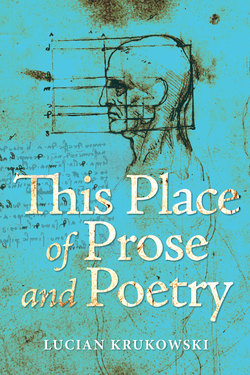Читать книгу This Place of Prose and Poetry - Lucian Krukowski - Страница 6
На сайте Литреса книга снята с продажи.
PLACES IN MIND
ОглавлениеMind, when considered in its purity, does not show us something in a place.
Rather, it shows us that there is nothing in experience which can construct a something that denies the attraction of other times and places. Particular minds that are appalled by the notion of a something-become-something-else, will always want an inviolable place—like a brain—to which we can trace everything we think and do. Some such minds may want more—perhaps a Heaven, or a Hell—which conquers time and change, and gives us ways to approach before-beginnings and after-ends. But such wanting requires making a nothing beyond existence into a something which has value as pure and boundless being—and also is the source of our becoming us. God is like that, but may not—however often it is said—want us to believe in something so arcane. But most believers do not want a cherished something to come from nothing, nor do they either want that something to end in nothing. For them, existence stretches infinitely in both ways, as it mounts a challenge to the nothing that others, mostly non-believers, believe lurks darkly on either side of beginnings and ends.
Those who have Faustian souls say we may begin at birth, but do not end in death—as we are a mirror of the world that begins at its own inception and, like us, will only end when it is finished—which is not so much death as a pause (for no worldly reason) in all that has been happening since the start. But pauses, as they are part of time, can herald a world that begins after we and ours are gone.
There are some (austere and nasty ones) who would rather have no commerce with either mind or soul—the brain is quite enough. For them, birth and death is all there is. Speculation to the contrary, they say, is just so much poetry. So much—(a great deal, actually)—for poetry.
Although many may reject theological solutions to the question of beginnings and ends, there remain the difficulties that have to do with the relationship of mind to body—a comparable tension—and a recapitulation in modern dress of the fugue that has provided historical continuity for both art and philosophy. Mind that has no place, and a brain that is empty of mind, are both unsettling notions—perhaps unthinkable. Nevertheless, attempts to resolve this have successively championed one or the other as the only feasible view of reality. But there is this:
Either we create the world (we know) through our perceptions, or accept an unperceived world that is beyond the one we know and live in. Then there is this:
Will God (if we go that way) still exist after all intelligible life in the universe has ended—or does (will) He (continue to) exist in a context that is no longer teleological—one that (for us) has no point or purpose?
After life and progress have ended—after all that—what else can God have in mind?
Those not entranced by the myth of divine creation, might believe that we do not, anymore than do tadpoles, create the world through our perceptions. The world is antecedent to the unexamined solipsism of tadpoles—and it also precedes the fretful solipsism of our own existence. Whether the world will continue beyond us, is a matter of extrapolation from the evidence—itself a matter of belief—that it was there before us.
